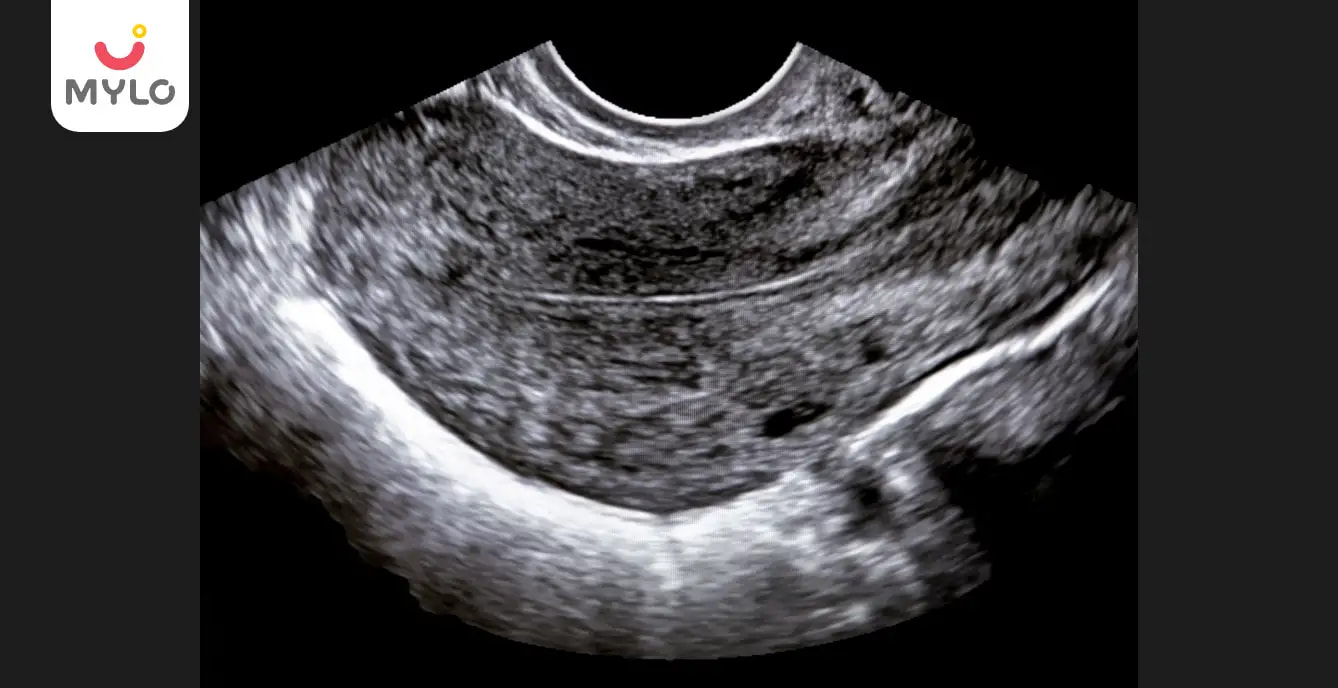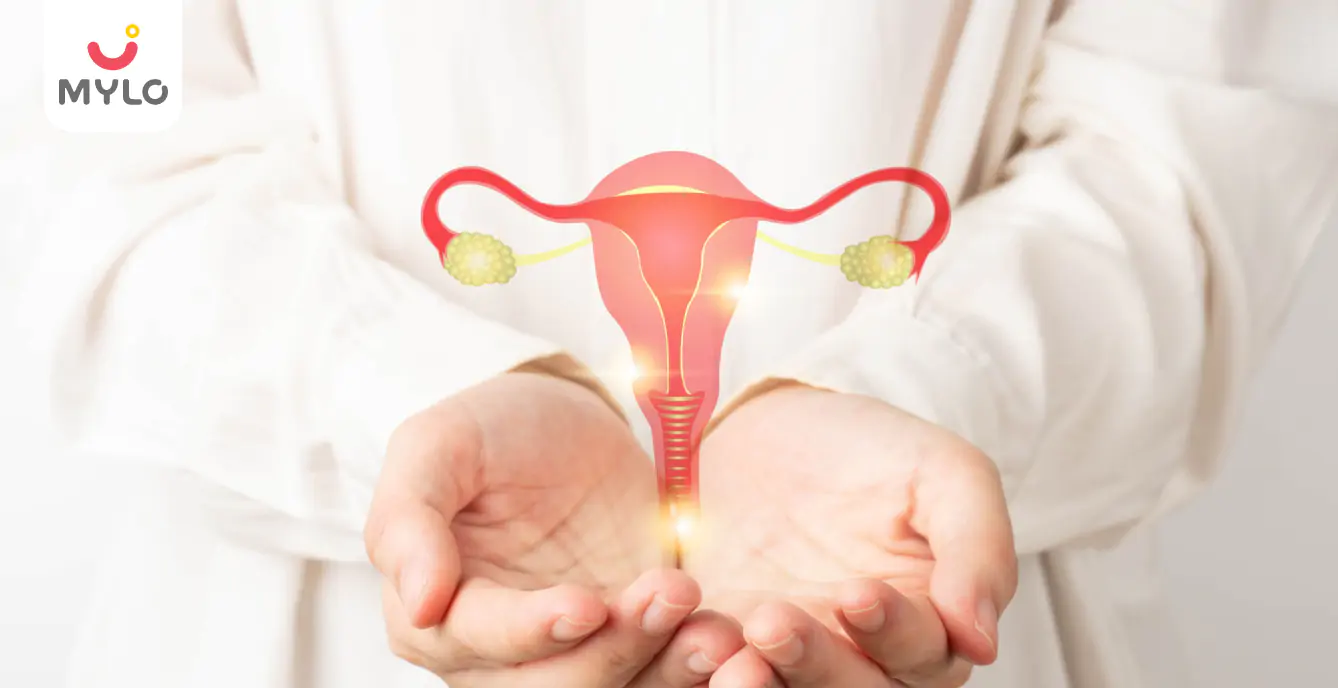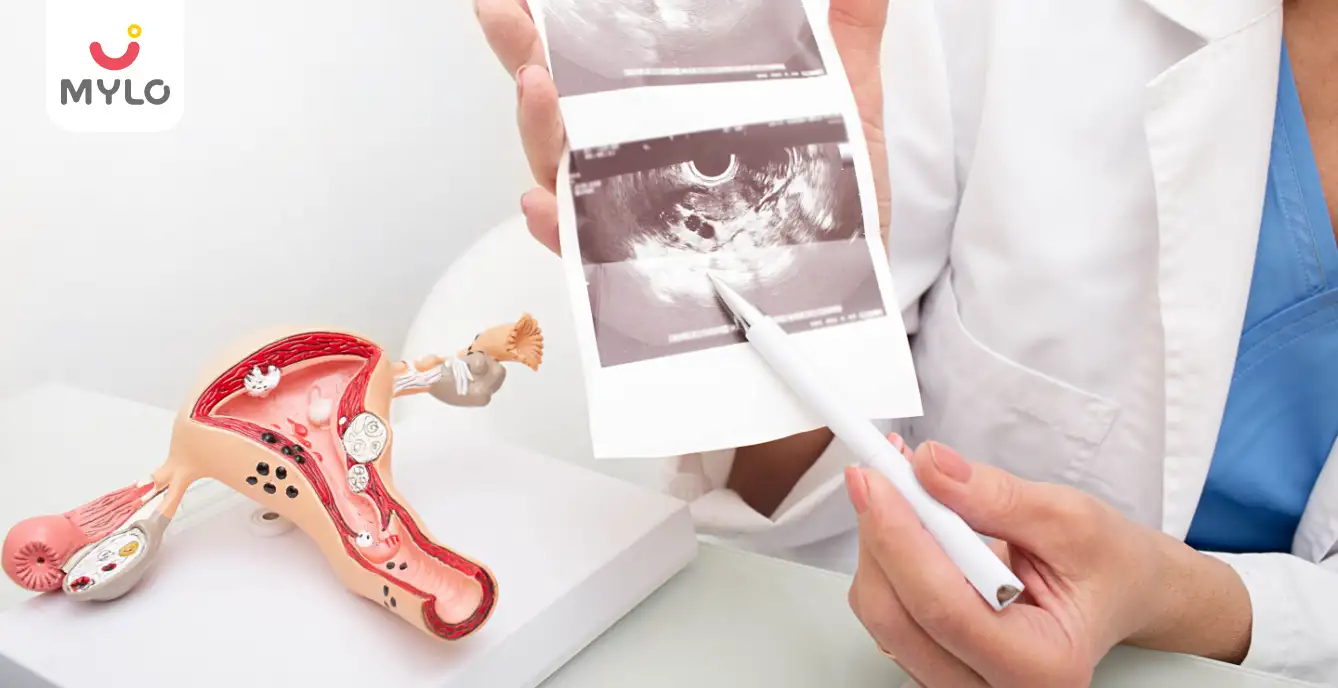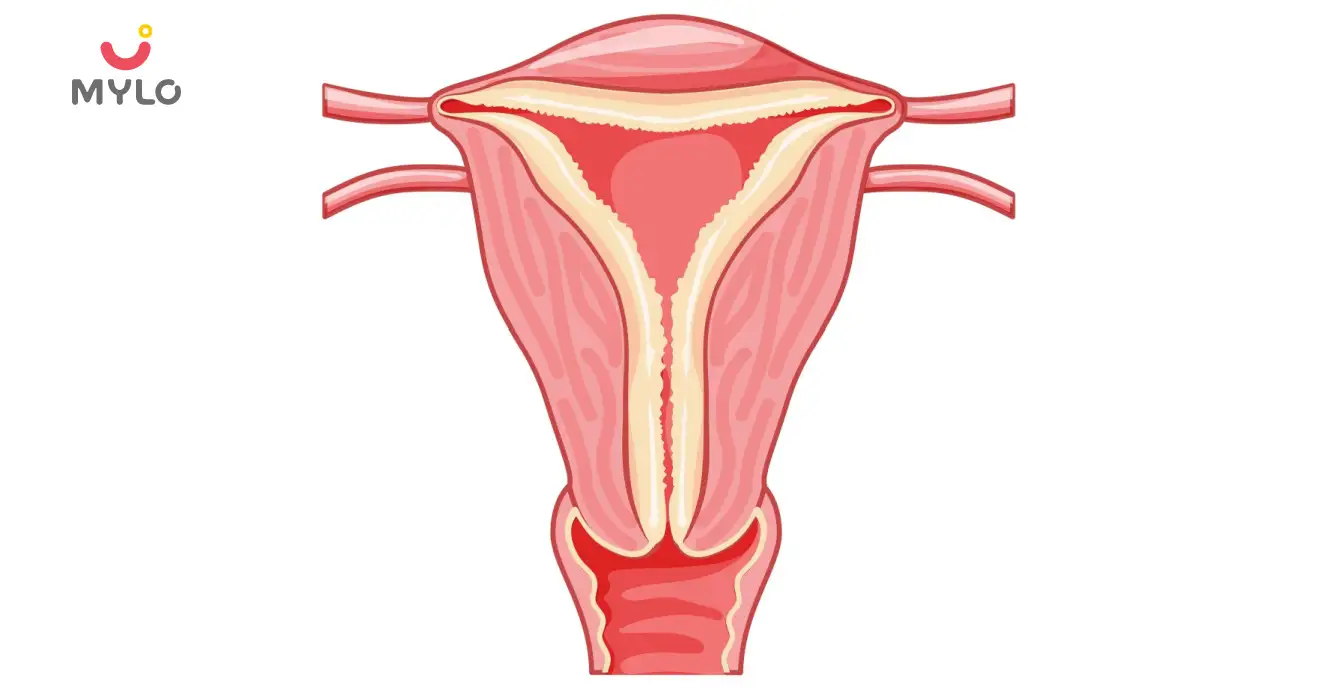Home

Women Specific Issues

Endometrial Thickness in Pregnancy: Your Guide to Understanding What is Normal
In this Article

Women Specific Issues
Endometrial Thickness in Pregnancy: Your Guide to Understanding What is Normal
Updated on 13 September 2023



Medically Reviewed by
Dr. Shruti Tanwar
C-section & gynae problems - MBBS| MS (OBS & Gynae)
View Profile

Pregnancy is a miraculous journey filled with wonder, anticipation, and countless questions. One essential cause of concern is the endometrial thickness in pregnancy or the lining of the uterus. Understanding what is normal in terms of endometrial thickness during pregnancy is crucial.
In this comprehensive guide, we will explore how the endometrium changes throughout different stages of pregnancy, what factors can influence its thickness, and most importantly, what constitutes normal ranges.
What is endometrial thickness?
The endometrium is the lining of the uterus that prepares itself for pregnancy every month. It is a dynamic tissue that undergoes changes in response to hormonal fluctuations. Endometrial thickness refers to the measurement of the endometrium, specifically its thickness, which can vary throughout a woman's menstrual cycle.
During pregnancy, the endometrial thickness becomes particularly important as it plays a crucial role in supporting the developing fetus.
What is the role of endometrium in pregnancy?
The endometrium in pregnancy is responsible for providing a nourishing environment for the fertilized egg to implant and grow. After fertilization occurs, the embryo travels through the fallopian tube and reaches the uterus.
At this point, the endometrium is thickened and rich in blood vessels, ready to receive and nurture the embryo. If implantation is successful, the endometrium continues to grow and develop into the placenta, which is essential for the exchange of nutrients and waste between the mother and the fetus.
Pregnancy normal endometrial thickness
During a normal pregnancy, the endometrial thickness undergoes specific changes that are considered within the normal range. In the first few weeks of pregnancy, the endometrial thickness typically remains relatively unchanged from the non-pregnant state.
It is only after implantation occurs that the endometrium starts to thicken. Endometrial thickness in early pregnancy measures around 2-4 millimeters. This thickening is necessary to support the growing fetus and provide adequate blood supply.
By the second trimester, the endometrial thickness can range from 5-10 millimeters. Towards the end of pregnancy, the endometrium may further thicken to around 10-15 millimeters. It's important to note that these measurements are approximate and can vary from person to person. It's always best to consult with a healthcare provider for personalized information and guidance.
What is Abnormal Endometrial Thickness in Pregnancy?
Measurements that deviate from the expected range for a healthy pregnancy are deemed abnormal endometrial thickness. It is important to note that abnormal thickness does not necessarily indicate a problem, as there can be variations among individuals. However, significant deviations from the normal range may warrant further investigation and monitoring.
Abnormal endometrial thickness can be associated with conditions such as endometrial hyperplasia, uterine polyps, or even endometrial cancer. A thorough evaluation by a healthcare professional is necessary to determine the cause and appropriate management.
How Important is Endometrial Thickness in Early Pregnancy?
In early pregnancy, endometrial thickness is of significant importance as it directly affects the success of implantation and the subsequent development of the fetus. An optimal endometrial thickness is necessary for the embryo to implant firmly into the uterine lining and establish a connection with the mother's blood vessels.
In cases where the endometrial thickness is inadequate, it can lead to implantation failure or an increased risk of miscarriage. Therefore, monitoring and assessing the endometrial thickness during early pregnancy are essential to ensure the best possible outcome for both the mother and the developing baby.
Endometrial Thickness 4 Weeks Pregnant
At 4 weeks pregnant, the endometrial thickness is still in the early stages of development. It is important to note that the measurement of endometrial thickness at this stage may not be as accurate due to variations in ultrasound techniques and individual differences.
However, on average, pregnancy normal endometrial thickness at 4 weeks can range from 5 to 8 millimeters. It is crucial to consult with a healthcare provider to interpret the ultrasound results accurately and determine if the endometrial thickness is within the expected range for a healthy pregnancy.
You may also like : Endometrial Scratching: The Ultimate Guide to Meaning, Benefits and Impact on Conception
What are the Factors Affecting Endometrial Thickness During Pregnancy?
Several factors can influence the endometrial thickness throughout pregnancy. These include:
1. Hormonal fluctuations
Hormones, such as estrogen and progesterone, play a crucial role in regulating the thickness and development of the endometrium. Any imbalances in these hormones can impact the endometrial growth.
2. Age
As women age, the endometrium may become thinner, affecting its ability to support a pregnancy. This is particularly relevant for women in their late 30s and 40s.
3. Uterine abnormalities
Structural abnormalities of the uterus, such as polyps, fibroids, or adhesions, can disrupt the normal growth of the endometrium.
4. Inflammation or infection
Infections or inflammatory conditions of the uterus can lead to abnormal thickening or thinning of the endometrium.
5. Medications or medical treatments
Certain medications or medical treatments, such as hormonal therapies or chemotherapy, can affect endometrial thickness.
You may also like : How to Increase Endometrial Thickness: Your Guide to Science-Backed Tips
How to Maintain Optimum Endometrial Thickness in Early Pregnancy?
Maintaining optimum endometrial thickness during pregnancy is essential for a healthy and successful gestation. Here are five ways to help maintain a healthy endometrium:
1. Balanced Diet
Include foods that are high in vitamins, minerals, and antioxidants, such as fruits, vegetables, whole grains, lean proteins, and healthy fats. These nutrients support the growth and development of the endometrium.
2. Adequate Hydration
Staying properly hydrated is important for maintaining optimal endometrial thickness. Drinking an adequate amount of water throughout the day helps ensure proper blood circulation and nutrient delivery to the endometrium.
3. Regular Exercise
Engaging in regular physical activity promotes healthy blood flow to the uterus, which can positively impact endometrial thickness. Moderate-intensity exercises like walking, swimming, and prenatal yoga can be beneficial. However, it's important to consult with a healthcare provider to determine the appropriate level of exercise for your individual circumstances.
4. Stress Management
High levels of stress can negatively affect endometrial thickness. Practice stress management techniques such as meditation, deep breathing exercises, yoga, or engaging in activities that you enjoy. Finding healthy ways to cope with stress can help maintain a healthy endometrium.
5. Regular Monitoring
Regular monitoring of endometrial thickness through ultrasound scans is crucial during pregnancy. This allows healthcare providers to assess the thickness and make any necessary interventions if it falls outside the normal range. By closely monitoring the endometrial thickness, you can ensure early detection of any potential issues and take appropriate actions to maintain its health.
Remember, every pregnancy is unique, and it's important to consult with your healthcare provider for personalized advice and guidance on maintaining pregnancy normal endometrial thickness.
You may also like : Normal Endometrial Thickness: A Key Indicator of Female Fertility
Final Thoughts
Understanding endometrial thickness in pregnancy is crucial for both healthcare providers and expectant mothers. Monitoring and assessing the endometrial thickness can provide valuable information about the health of the pregnancy and the potential risk of complications. If you have any concerns about your endometrial thickness during pregnancy, it is always best to consult with your healthcare provider for proper evaluation and guidance.
Reference
1. Zhao J, Zhang Q, Li Y. (2012). The effect of endometrial thickness and pattern measured by ultrasonography on pregnancy outcomes during IVF-ET cycles. Reprod Biol Endocrinol.





Medically Reviewed by
Dr. Shruti Tanwar
C-section & gynae problems - MBBS| MS (OBS & Gynae)
View Profile


Written by
Anupama Chadha
Anupama Chadha, born and raised in Delhi is a content writer who has written extensively for industries such as HR, Healthcare, Finance, Retail and Tech.
Read MoreGet baby's diet chart, and growth tips

Related Articles
Related Questions
Hello frnds..still no pain...doctor said head fix nhi hua hai..bt vagina me pain hai aur back pain bhi... anyone having same issues??

Kon kon c chije aisi hai jo pregnancy mei gas acidity jalan karti hain... Koi btayega plz bcz mujhe aksar khane ke baad hi samagh aata hai ki is chij se gas acidity jalan ho gyi hai. Please share your knowledge

I am 13 week pregnancy. Anyone having Storione-xt tablet. It better to have morning or night ???

Hlo to be moms....i hv a query...in my 9.5 wk i feel body joint pain like in ankle, knee, wrist, shoulder, toes....pain intensity is high...i cnt sleep....what should i do pls help....cn i cosult my doc.

Influenza and boostrix injection kisiko laga hai kya 8 month pregnancy me and q lagta hai ye plz reply me

Related Topics
RECENTLY PUBLISHED ARTICLES
our most recent articles

Menstrual Cycle
Hypomenorrhea: When Your Period is Lighter Than Usual

Scans & Tests
Anti Mullerian Hormone Test: The Key to Early Detection of Fertility Issues

Medical Procedures
Benefits of HSG Test: The Secret to Boosting Your Chances of Getting Pregnant

Reproductive health
Deviry Tablet Uses: How to Maximize The Benefits for Your Reproductive Health

In Vitro Fertilization (IVF)
Endometrial Thickness for IVF: The Ultimate Guide to Successful IVF Outcomes

Fertility
Normal Endometrial Thickness: A Key Indicator of Female Fertility
- Uterine Artery Embolization: A Non-Invasive Solution for Fibroids
- Deviry 10mg for Menstrual Disorders: Is It the Right Choice for You
- Hyperprolactinemia: How High Prolactin Levels Can Affect Your Chances of Conception
- Myomectomy: A Comprehensive Guide to Uterine Fibroid Removal Surgery
- The Hormonal Dance: Understanding Which Hormones Regulate Menstrual Cycle
- 7 home remedies to cure cough and cold in infants
- How to Increase Endometrial Thickness: Your Guide to Science-Backed Tips
- Endometrial Scratching: The Ultimate Guide to Meaning, Benefits and Impact on Conception
- The Ultimate Guide to Buying a Baby Bath Tub for New Parents
- Strawberry in Pregnancy: Why Should This Fruit Be on Your Pregnancy Platter?
- Benefits of Wearing a Pregnancy Belt Before Delivery
- PCOS Treatment in Homeopathy: The Ultimate Guide to Natural Remedies
- Manjistha: Ayurveda's Best-Kept Secret for Health and Beauty
- Metformin for PCOS: How This Medication Can Help Regulate Hormonal Imbalances


AWARDS AND RECOGNITION

Mylo wins Forbes D2C Disruptor award

Mylo wins The Economic Times Promising Brands 2022
AS SEEN IN

- Mylo Care: Effective and science-backed personal care and wellness solutions for a joyful you.
- Mylo Baby: Science-backed, gentle and effective personal care & hygiene range for your little one.
- Mylo Community: Trusted and empathetic community of 10mn+ parents and experts.
Product Categories
baby carrier | baby soap | baby wipes | stretch marks cream | baby cream | baby shampoo | baby massage oil | baby hair oil | stretch marks oil | baby body wash | baby powder | baby lotion | diaper rash cream | newborn diapers | teether | baby kajal | baby diapers | cloth diapers |




